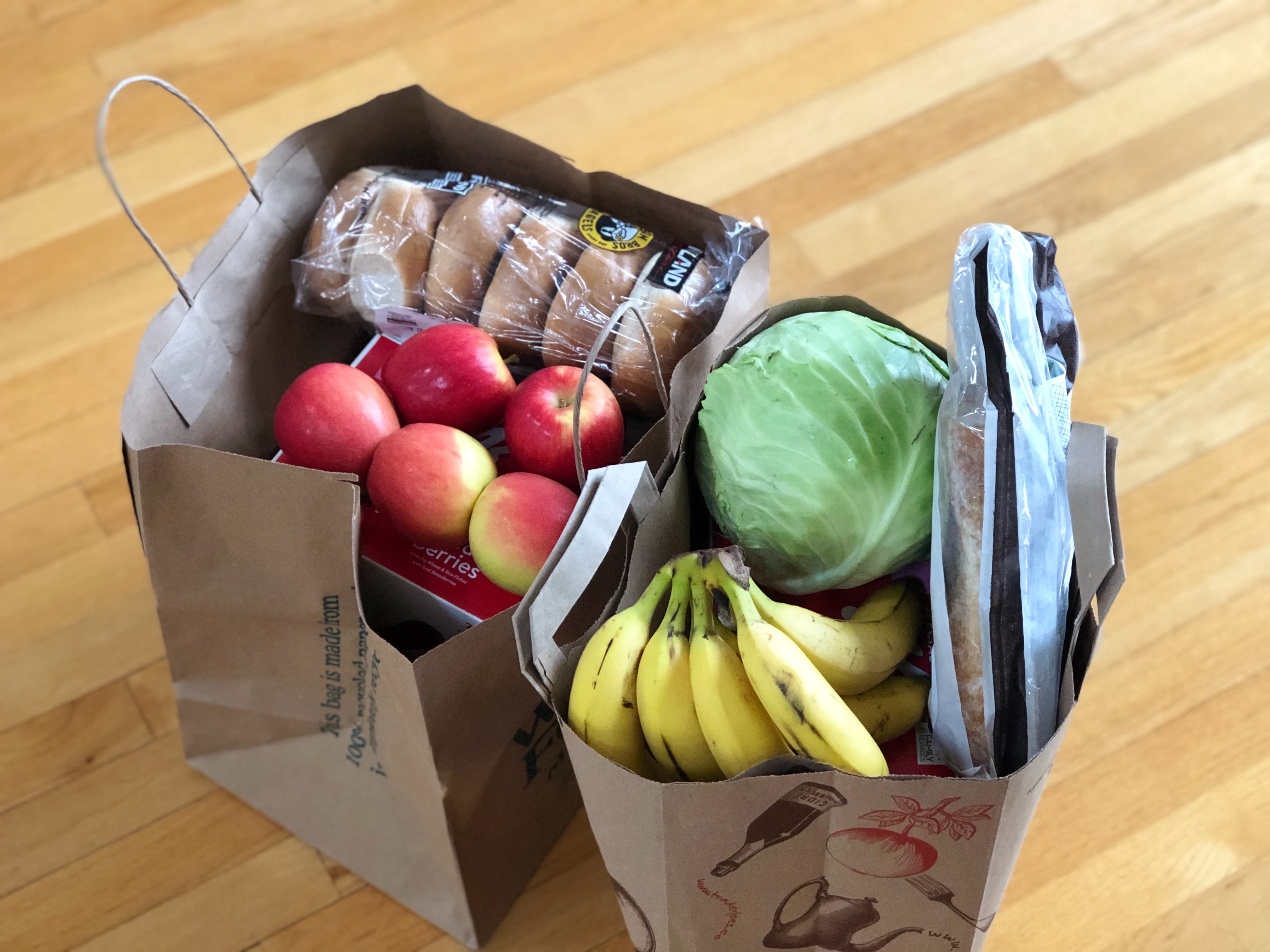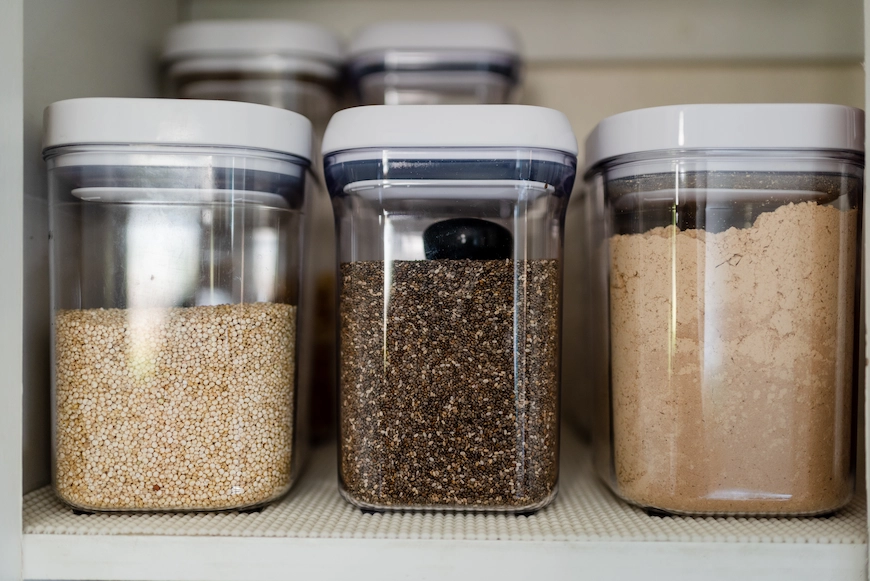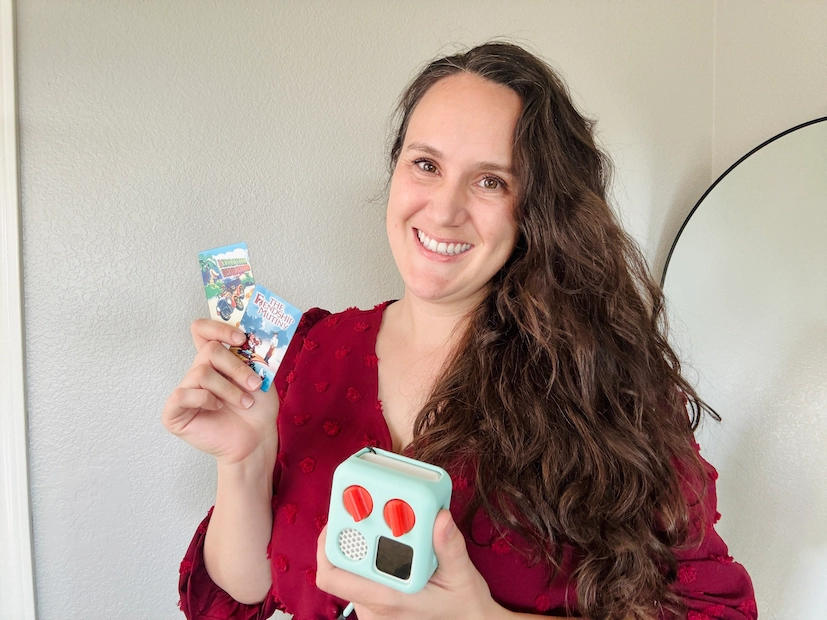This post contains affiliate links. If a purchase is made by clicking on a link, I will get a small commission at no extra cost to you.
Learn how to save money by making your groceries last longer! Try implementing these hacks and you can shrink waste and waist! You’ll have more money in your pocket, and more room in those skinny jeans! I do not like wasting money or food, so I’ve found some tricks on how to stretch what you have in your fridge + pantry.
11 Ways to Make Groceries Last Longer
1. Check the Expiration Date
Ok, this is an obvious tip but make it a priority to CHECK every date on things you buy from the grocery store. Some items have a longer shelf life than other items and not everything has an expiration date. When I buy milk and heavy cream, I sort through a few jugs until I find the one with the furthest expiration date. Items like bagged salad and bread usually have an expiration date about 12 days or less on them. Plan to eat the items that expire sooner first. If you stock up on some items like bread, keep one loaf in the fridge at a time, then freeze the rest of the loaves. I have kept bread in both in the fridge and outside of the fridge. I live in a hot/dry area, so I have found that bread has molded when I keep it in the cabinet, so now I only keep it in the fridge.
2. Invest in Stasher Bags
These bags are amazing. They are made from platinum silicone and are free from BPA, BPS, lead, latex, and phthalates. What I LOVE about them is that they are microwave, freezer, fridge, and dishwasher safe. You can use them over and over, so you don’t have to keep buying plastic food baggies. Since they are thick, they keep moisture out, which in turn makes food last longer. I use Stasher bags for cheese, raw chicken, fruit, garlic, nuts, crackers, and vegetables. When you seal the bags, just be sure to gently press down on the food and push out any excess air.

3. Use a Fruit & Veggie Wash
Washing fruit and vegetables with a fruit & vegetable wash will rid pesticides, waxes, and soil. Simply spray on your fruit and/or vegetables when you first bring them home. Let it sit for about two minutes, gently scrub and wash off, then let dry completely on a clean dishtowel. The fruit & veggie wash has a natural preservative in it that will extend the life of your fruit and vegetables.

4. Store Berries, Veggies, Nuts, etc in Mason Jars
Not only is storing fruit in mason jars aesthetically pleasing, but it is better than storing in the flimsy plastic it comes in. I’ve found that berries (once brought from the grocery store), love the cold. Storing berries in glass jars extends their life, and you can store them for about two weeks! Mason jars are great because they prevent mold and bacteria growth. I’ve also made pickled red onions and pickled radishes and kept them in the fridge. They lasted MONTHS! Also, mason jars are great for meal prep frozen smoothies. Just make sure if you get jars with “shoulders” that you don’t fill all the way to the top because it will burst in the freezer.

5. Strategize your Grocery List
On hand, you should always have non-perishable foods like quinoa, pasta, rice, canned goods, seasonings & spices, sugar, honey, coffee, tea, flour, nuts, un-popped popcorn, and dried fruits. This will serve as a good foundation for most meals and snacks. Once you are established with dry goods, then you only have to worry about items with a shorter shelf life like produce, dairy and meat. Depending on how many people are in your family, only leave out fresh meat for that week, then freeze the rest. Eat meals that will expire early on in the week-start out the few days after a shopping trip with salad and veggies. Eating less carbs will not only be good for you, but will also make you eat more of the fruits and vegetables, and prevent them from going bad. Also, try not eating out as much, or if you eat out a few times a week, just buy less food.
6. Buy Foods that Have Longer Shelf Lives
I have noticed that potatoes, garlic, onions, carrots, apples, sometimes citrus, will last for weeks-months. Do keep an eye on them though to make sure they aren’t developing mold or spores. Honey also never expires because of its antibacterial properties, and many sugar-based foods have a high tolerance against bacteria. That’s why cookies can be kept out at room temperature for hours, but other foods usually have a 4-hour rule. We like to have bacon for breakfast. I switched to buying fully-cooked bacon because it has a shelf life for months after my purchase date, versus uncooked bacon that lasts about two weeks. It is the same as uncooked bacon, just thinner slices. I enjoy that is isn’t slimy like pulling uncooked bacon out lol.
7. Store Citrus in Water
Storing lemons, limes, oranges, grapefruit, etc fully submerged in water will help your citrus last longer, up to 3 months experts say. These are not only a beautiful way to showcase your fruit inside the fridge, but it keeps moisture locked in your fruit helping them to last way longer!

8. Less is More
Chances are you have or have had a fridge that is so full that every time you open it you play Tetris to get out something to eat. Although a fully stocked fridge can make you feel like you won’t have to make as many trips to the grocery store, or you’ll never go hungry, it can be a bad habit because of the old adage, “out of sight, out of mind”. If your fridge is overstocked, you can’t possibly keep up with everything to ensure it doesn’t get wasted. Keeping your fridge neat and in order with less stuff will make you more conscientious of what you have on hand. This will also prevent food from spoiling. I like to go by the rule that I should be able to see the back of the fridge, that is about as much food my husband and I can consume without it going to waste.

9. Always Have a Checklist
Think of the basics that you always buy. For our home, we always have milk, almond milk, heavy cream, eggs, butter, and cheese as far as perishable items that are kept in the fridge. When one of these items runs out, I know without even having to write it down on my , that my next trip I need to replenish those items. For fruits and vegetables, we usually have dried fruit (mission figs are my favorite), onions, garlic, shallots, corn on the cob, potatoes, avocados, lemons & limes, tomatoes, romaine, spinach, kale, and apples. For non-perishable items, we always have chia seeds, quinoa, pasta, rice, un-popped popcorn, nuts, as well as baking ingredients (flour, baking powder, baking soda, etc). Get into a rhythm and buy food that you and your family will eat, and will eat in a timely manner.

10. Buy Unripe Fruit
I think since I live in a warmer climate, my avocados always ripen faster than I’d like them to. I always buy the greenest avocados I can, so that they have a little extra time to develop. Same with bananas, buy green bananas unless you are planning to use them immediately. The nice thing about bananas that even though they might get bruised and brown, they are still good! Throw them in a smoothie with peanut butter, and no one will be the wiser. Another way to use them in banana bread which is best with very ripe bananas.

11. Cook According to Portion Size
Don’t get me wrong, leftovers are great! However, too many leftovers can be a problem. Unless you eat leftovers for breakfast, lunch, and dinner, they will most likely go to waste. Most Americans have small-medium sized families from about 2-6 people. Only cook food according to how many people are eating a meal. If you are saying, “but I have teenagers!” or “my husband has a ravenous appetite!” Drink. More. Water. Often times our bodies falsely tell us we are hungry when we are just dehydrated. Try drinking water 20 minutes before meals, or even a few glasses during a meal. If you are still hungry, have some snacks or a healthy dessert for you/them to eat. We often are the reason we have “huge” appetites because we have trained our stomach to eat more than enough food, and our stomachs will stretch to keep up. The goal is to have one small box of leftovers to prevent your food from going to waste. Remember, leftovers take up room, and can make your fridge crowded, preventing you from seeing what you really have.
Check out more of my organization blog posts, and don’t forget to follow me on Pinterest! 🙂














